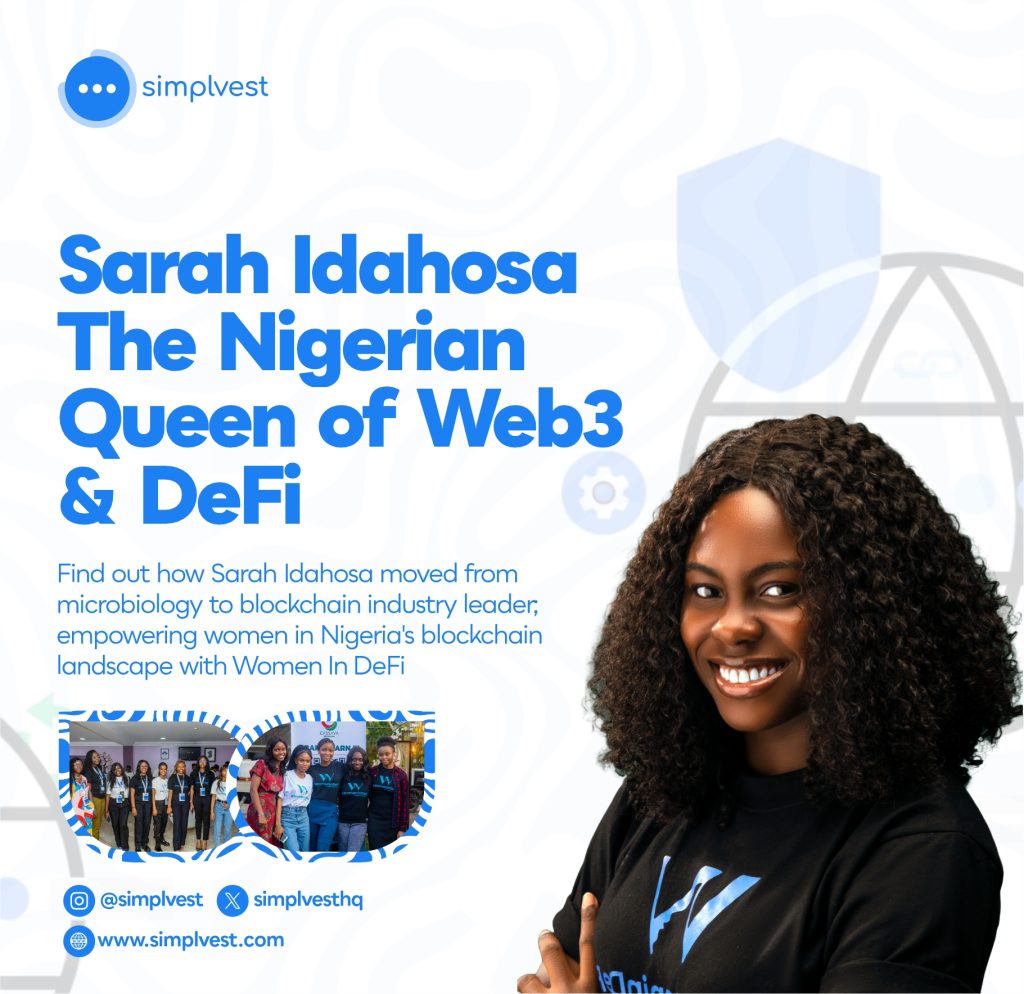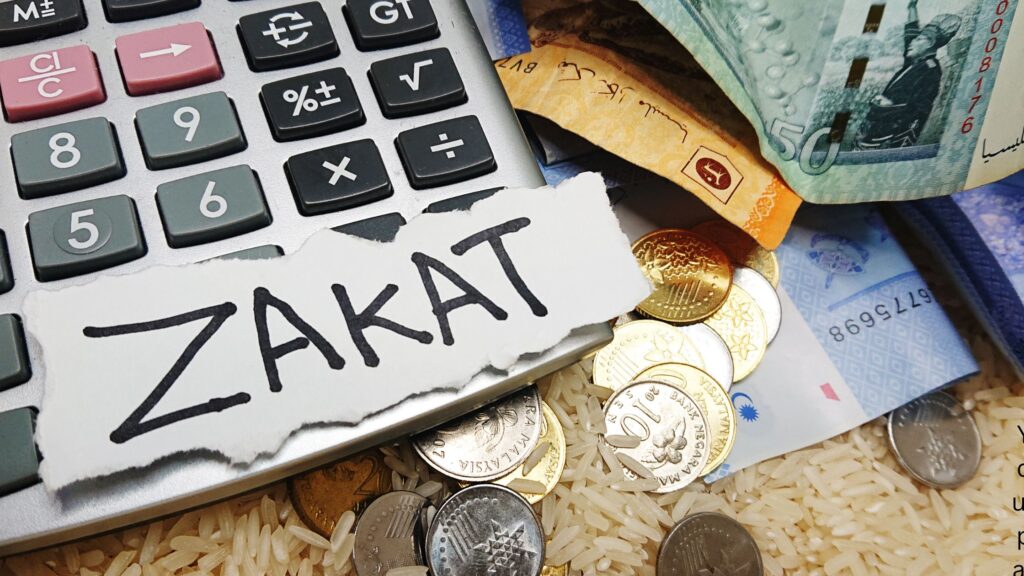Sarah Idahosa went from a career in microbiology to becoming a blockchain industry leader. How? Read on to find out more!

Gone are the days when conversations about blockchain revolved solely around airdrops and get-rich-quick schemes. At least, that’s the story for Sarah Idahosa, a microbiologist who, like many Nigerians, initially saw blockchain as a potential money machine.
But a misstep became a life-changing opportunity, propelling her from curious newcomer to industry leader. Today, Sarah isn’t just a blockchain expert and mentor; she’s the founder of “Women In DeFi,” an organisation empowering women across Nigeria with the knowledge to navigate the exciting – and complex – world of blockchain technology, Decentralized Finance (DeFi), and NFTs.
We had a quick chat with her to discuss:
- How she flipped a misfortune and journey started
- How web3 can promote financial inclusion for women
- Managing risks in the sector, as well as her work with WomenInDefi
- How you can navigate the exciting frontier of blockchain, the right way.
So, Web3 and decentralized finance– that’s pretty serious. Can you tell us how you got into that? Your background and journey, all that?

Sarah: Certainly. My journey into Web3 and decentralized finance was quite unconventional. I have a microbiology background from Federal Polytechnic, Auchi, which is a far cry from anything we’re talking about today. So, it’s safe to say I accidentally stumbled into the blockchain world. Initially, I saw blockchain as merely a platform for making quick money.
However, a significant loss due to my lack of understanding changed my perspective entirely. It was the time I had invested in Ethereum, but thanks to some ill-informed decisions and for fear of missing out, I quickly sold it off. As you may know, its value rose, and I was left high and dry.
I guess you could say FOMO ironically made you miss out (no pun intended)
Sarah Idahosa: Hahaha, yes indeed. That was the turning point for me anyway. I was determined to learn more, so I immersed myself in education, enrolling in the Nirvana Academy– and I was like, ‘Oh, I’m good at this. It interests me a lot!’ which eventually led me to transition into a blockchain industry career. Today, I’m proud to be a Web3 community consultant (Africa Tech Summit) and the founder of Women In DeFi, empowering women to navigate and excel in this space.

I’m also the Community Manager for Cassava Network, where we’re spearheading the revolution in blockchain infrastructure, empowering developers, ensuring advertiser engagement, and rewarding users for their attention in the crypto space.
That’s an inspiring start to an amazing story! We’ll get to Women In DeFi in a bit, but first, let’s talk inclusion. Web3 is arguably a male-dominated space, but that doesn’t mean women don’t have stakes in this. How can Web3 promote financial inclusion, especially for women?
Sarah Idahosa: Web3 has the potential (an immense promise actually) to revolutionize financial inclusion, particularly for women who have historically faced barriers in accessing traditional financial services. Unlike traditional finance, which often erects barriers to entry, Web3’s decentralized nature offers equal opportunities. Through blockchain technology, women can access peer-to-peer lending, tap into global markets, and securely own digital assets without relying on intermediaries.
This empowers women financially and enables them to take control of their financial destinies, encouraging greater economic independence and inclusion in the digital economy. And not to sound like a PR campaign, but Web3’s decentralized nature means a level playing field where merit and innovation, rather than gender or background, determine success. Web3 opens doors for women to participate in economic activities and access financial services on their terms.
Insightful. You’ve mentioned historical barriers in traditional finance, but what about DeFi? Surely, there must be some barriers there. What challenges and opportunities do women face in DeFi?
Sarah Idahosa: Sure. Women in DeFi often encounter barriers such as lack of access to education, limited networking opportunities, and gender biases within the industry.
However, these challenges also present opportunities for women to carve out their niche, leverage their unique perspectives, and drive innovation in the DeFi space. When we can establish and encourage a supportive community and provide targeted mentorship, we empower women to overcome these obstacles and thrive in DeFi.
Fantastic. Now, let’s look at the bigger picture, though. What kind of blockchain/DeFi knowledge would benefit young Nigerians?
Sarah Idahosa: That’s a no-brainer. In Nigeria, where unemployment rates are high, blockchain and Web3 education can provide valuable skills for young people to sustain themselves and their families while building careers. It’s an opportunity for bettering lives– and this sort of education would mean:
- Understanding blockchain fundamentals, smart contracts, decentralized exchanges, and wallet security.
- Learning about various DeFi protocols like lending platforms, decentralized exchanges (DEXs), yield farming, and governance.
- And, of course, it emphasizes the importance of due diligence, risk management, and security practices in the DeFi space.
It’s the whole package.
The whole package, indeed. But what about the debate between Traditional Finance vs. DeFi? Especially for a country like Nigeria, where everyone likes to be extra cautious. How do you see these two sectors coexisting and complementing each other in the future?

Sarah: Hmm. Traditional finance and DeFi are often viewed as opposing forces, but I believe they can actually complement each other quite effectively, particularly in a country like Nigeria, where caution is a common trait. Traditional finance provides a solid foundation with stability, established legal frameworks, and deep sector-specific knowledge. On the other hand, DeFi offers unparalleled accessibility, efficiency, and transparency through blockchain technology.
In Nigeria, DeFi’s transparency and decentralization can provide an attractive alternative. However, traditional finance institutions bring invaluable expertise and experience, especially in navigating complex regulatory environments.
The answer is encouraging cooperation rather than competition. These two sectors can collaborate to develop innovative solutions that harness both strengths. For example, integrating blockchain technology into traditional banking systems means more transparent and faster processes while ensuring that regulations and laws are followed. In simpler terms, it could be more accessible to track your money, reduce errors, and help regulators ensure everything is done by the books.
Since we’re on the topic, with the rise of DeFi, there’s increased focus on security. How can we better educate users, particularly women who might be new to the space, about managing DeFi risks?

Sarah: Education on security and risk management in DeFi is crucial, especially for newcomers, including women. Providing instructional materials on understanding DeFi protocols, safely storing private keys, identifying scam projects, and diversifying investment portfolios is essential. Collaborative efforts with educational institutions, community organisations, and business leaders can further improve this education through webinars, workshops, and mentorship initiatives. That’s some of the work we do at WomenInDeFi.
Great! That brings us right back to WomenInDeFI. Can you share more about your organisation and its mission?
Sarah: Women In DeFi is a non-profit organisation promoting knowledge and empowerment among women in Blockchain Technology and Decentralized Finance. What we want the most in the world is a thriving, inclusive community of women in the blockchain space, where we can innovate and lead towards a more equitable digital future. Through mentorship, education, and collaboration, we strive to break down barriers and nurture future leaders in the blockchain space.
So, girl power, but the Web3 and DeFi version? Love it!

Sarah: Hahaha, yes, you can say that! Our watchword is empowering women to succeed in the blockchain space.
pretty cool! What motivates you in your work with Women In DeFi, and what do you hope to achieve?
Sarah: My motivation stems from the tangible impact we have on women’s lives in the blockchain space. It is incredibly rewarding to see them transition from having little to no knowledge about blockchain to building careers and achieving financial independence. In the future, I plan to continue expanding Women In DeFi’s reach, empowering more women, and encouraging greater diversity and inclusivity in the Web3 scene.
Finally, what advice do you have for women (or anyone really) looking to start a career in blockchain and DeFi? Any strategies for success?
Sarah Idahosa: My advice for women (or my WID Baddies) looking to start a career in blockchain and DeFi is to embrace learning, seek out mentors and networking opportunities, and never be afraid to take risks. The blockchain industry is constantly evolving, with endless opportunities for growth and innovation.

I’ll say the same thing to anyone else— approach with a curious and open mind. Start by educating yourself on the fundamentals of blockchain technology and DeFi protocols, but don’t stop there. Keep up to date about the latest developments and trends in the industry, and be willing to adapt and learn as everything evolves.
Of course, always conduct thorough research and due diligence before making any investment or career decisions—don’t be afraid to seek help and ask questions.
As for success strategies, leverage social media and content creation. Share insights, reviews, and tutorials about your DeFi journey on social media and blogs; just establish yourself as a thought leader in the space. This will not only help educate others but also open doors for collaborations, job opportunities, and speaking engagements, solidifying your place in the DeFi ecosystem.

Who knew a “blockchain blunder” could unlock a world of opportunity? Sarah’s journey reminds us that even missteps can lead to incredible discoveries. And speaking of discoveries, if you’re curious to learn more and join a supportive community, check out Women In DeFi!












